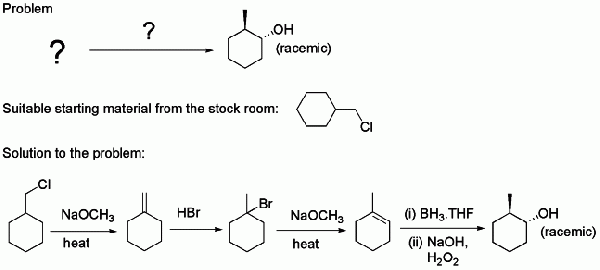Difference between revisions of "Organic synthesis game"
(adjust images) |
(→Game scenario: alter original & new image size) |
||
| Line 19: | Line 19: | ||
;A more challenging synthesis: | ;A more challenging synthesis: | ||
| − | [[Image:LongerSynthesis. | + | [[Image:LongerSynthesis.gif|600px|center|A more challenging synthesis]] |
More to follow.... | More to follow.... | ||
Revision as of 14:51, 28 October 2006
The organic synthesis game (aka Grand Theft Orgo) is being developed to help students in introductory organic chemistry courses learn techniques for synthesis design. This includes getting students acquainted with the reagents, the reactions and overall synthetic strategies.
Organic synthesis
In organic synthesis, the goal is to prepare a target molecule from a starting material (or several starting materials) and a set of reagents. At the introductory level, this usually involves only a few steps, as in:
Each transformation is referred to as a chemical reaction using a method that specifies the best reaction conditions, such as temperature, solvent, catalyst, etc. The efficiency of a process is measured in terms of percent chemical yield. If the student chooses conditions or solvents that would still work, but which are suboptimal, the yield would be reduced.
Game scenario
You are an alchemist working for the king in a castle. For tools you have some raw materials to use as starting materials for your synthesis, and also you have some solvents, reagents and catalysts. You may also apply certain conditions such as heat or light. The king sets tasks for you, in the form of target molecules that serve some useful purpose.
Initially you have a very limited range of tools and conditions, but the tasks you are assigned will be simple (typically single-step syntheses). As you succeed in the simple tasks, your laboratory will grow and you will be given more tools and conditions to work with, but the tasks will also get progressively harder.
- A simple synthesis, suitable for the "training period" at the start
- A more challenging synthesis
More to follow....

